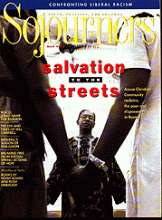COOKING A MEAL is sometimes the easy part. Often cleanup is tougher than pre-meal labor. A kitchen disaster scene -- grated carrot on the floor, flour in the counter cracks, a zillion greasy measuring cups -- is much more fun to make than to clean up.
Better writers than I have espoused the spiritual benefits of washing dishes mindfully. But how about the garbage produced when peeling vegetables, opening cans, or removing protective plastic wrappers? How a person treats these leftovers also says a good deal about his or her worldview: Is it linear or cyclic, result- or process-oriented, myopic or global?
Modern America calls leftovers "waste" -- the messy remainders of a finished task that are shoved into a bin, placed on the curb, and taken away to be dealt with by someone else at an unknown location ... out of sight, out of mind, and out of my sanitary kitchen. Such a kitchen and such a mindset defy the cyclic nature of life, where things come back around and the death of the old nourishes the new. Thus re-cycling. It is a hopeful trend that many people now do indeed recycle.
I am impressed by the various ways different families handle their kitchen garbage. I watched a Seattle friend, who has a yard surrounded by field and forest, open up the window above her sink and with flair toss lettuce leaves and tomato cores out onto the lawn. A D.C. couple, living in a second-floor apartment, freeze their food scraps during the week, then take a Saturday jaunt to a friend's garden. Occasionally they may make a midnight foray to a wooded riverbank with a shovel.
Read the Full Article

